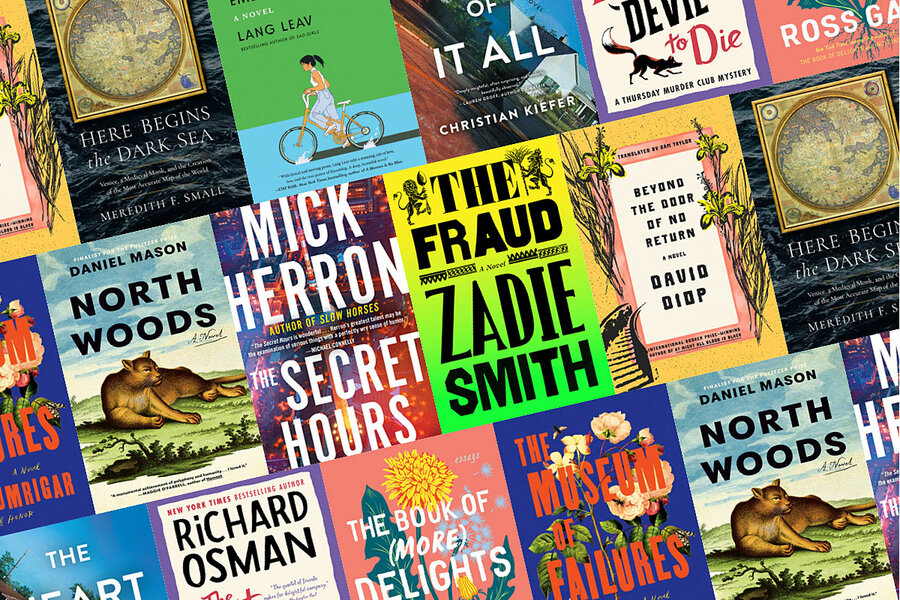Truth, forgiveness, and exploration: 10 best September reads
Loading...
Human beings are defined and enriched by their relationships.
Many of the characters in this month’s fiction learn to grow as individuals as they grapple with bias, search for truth, and struggle with loss.
Why We Wrote This
A story focused onSelf-discovery is a vital part of being human. Readers this month will find characters who, often through powerful relationships, grow significantly as they learn to define themselves.
In Zadie Smith’s historical novel about an infamous Victorian trial, for example, an Australian butcher claims to be the missing heir to an English fortune. The case exposes class conflicts, with working-class people taking up for the butcher and the upper echelon dismissing his claims. In the process, Smith dives deep into her characters’ inner psyches, deftly probing questions about identity, class, and bias.
And in nonfiction, Ross Gay’s introspective “The Book of (More) Delights” reflects on the small joys that give life meaning. In a series of charming essays, he demonstrates a vivid appreciation for the complexity of the human condition and seeks to answer many of the questions that reverberate throughout this month’s book selections.
1 The Fraud
by Zadie Smith
Zadie Smith’s historical novel about the notorious Victorian-era case of an Australian butcher claiming to be a long-missing heir to an English fortune raises ever-relevant questions about identity, class, bias, and how we separate truth from falsehood. It’s another bravura performance from Smith.
2 North Woods
by Daniel Mason
Why We Wrote This
A story focused onSelf-discovery is a vital part of being human. Readers this month will find characters who, often through powerful relationships, grow significantly as they learn to define themselves.
“North Woods” follows the story of a house in the woods of western Massachusetts and its occupants over four centuries. This dazzling novel intertwines the often tragically truncated lives of its characters and its wooded setting, all gorgeously captured in multiple literary styles, genres, and voices.
3 The Last Devil To Die
by Richard Osman
The fourth installment of Richard Osman’s “Thursday Murder Club” investigates a local antiques dealer’s point-blank execution. When a death at the retirement home forces a pause, the friends grieve, pay tribute – and grow. It’s a poignant new chapter in the bestselling series.
4 The Secret Hours
by Mick Herron
In Mick Herron’s superb thriller, a moribund investigation into the British Secret Intelligence Service lurches into gear when evidence of malfeasance lands in the agency’s lap. Bouncing between present-day London and mid-1990s Berlin, the expertly crafted tale probes political machinations, bureaucratic holdups, and the temptations of revenge. Come for the banter and Briticisms; stay for the conviction that it’s never too late to right past wrongs.
5 Others Were Emeralds
by Lang Leav
In her winning adult fiction debut, Lang Leav follows four close friends – all children of immigrants to Australia – as they navigate high school pressures, tiffs, and love on the cusp of the 21st century. When a racist confrontation leads to tragedy, Ai, the Cambodian Chinese teen at the novel’s center, must balance the solace she finds in art with the need to mourn and forgive.
6 Beyond the Door of No Return
by David Diop
From Booker Prize-winning author David Diop comes a story-within-a-story that builds with quiet force. While studying Senegal’s rich flora in 1749, young French botanist Michel Adanson meets a young Wolof woman. He falls head over heels, even as the turbulent alliances, rivalries, and dangers of the slave trade threaten them both. Wise to the ways truth shifts with its tellers, Diop has created a resonant novel.
7 The Heart of It All
by Christian Kiefer
Christian Kiefer’s portrait of a small Ohio factory town facing the twin problems of economic decline and cultural divides is indispensable reading. Tempering realism with empathy, the novel does not shy away from its characters’ struggles, while still highlighting hopes for a better future.
8 The Museum of Failures
by Thrity Umrigar
While caring for his estranged mother in a Bombay hospital, Remy Wadia uncovers family secrets. Thrity Umrigar’s evocative novel explores the personal, political, and cultural reckonings of an immigrant son discovering compassion and forgiveness.
9 The Book of (More) Delights
by Ross Gay
Ross Gay follows up his 2019 bestseller, “The Book of Delights,” with another collection of charming essays as quirky, engaging, and wryly humorous as the first. These reflections on what makes life meaningful offer a provocative episodic read.
10 Here Begins the Dark Sea
by Meredith F. Small
Cartographers owe no small debt to Fra Mauro, a 15th-century Venetian monk who created a detailed map of the world based less on legends and hearsay, and more on the eyewitness accounts of travelers, sailors, and traders. It’s a fascinating, if overly long, exploration of the history of map-making.







